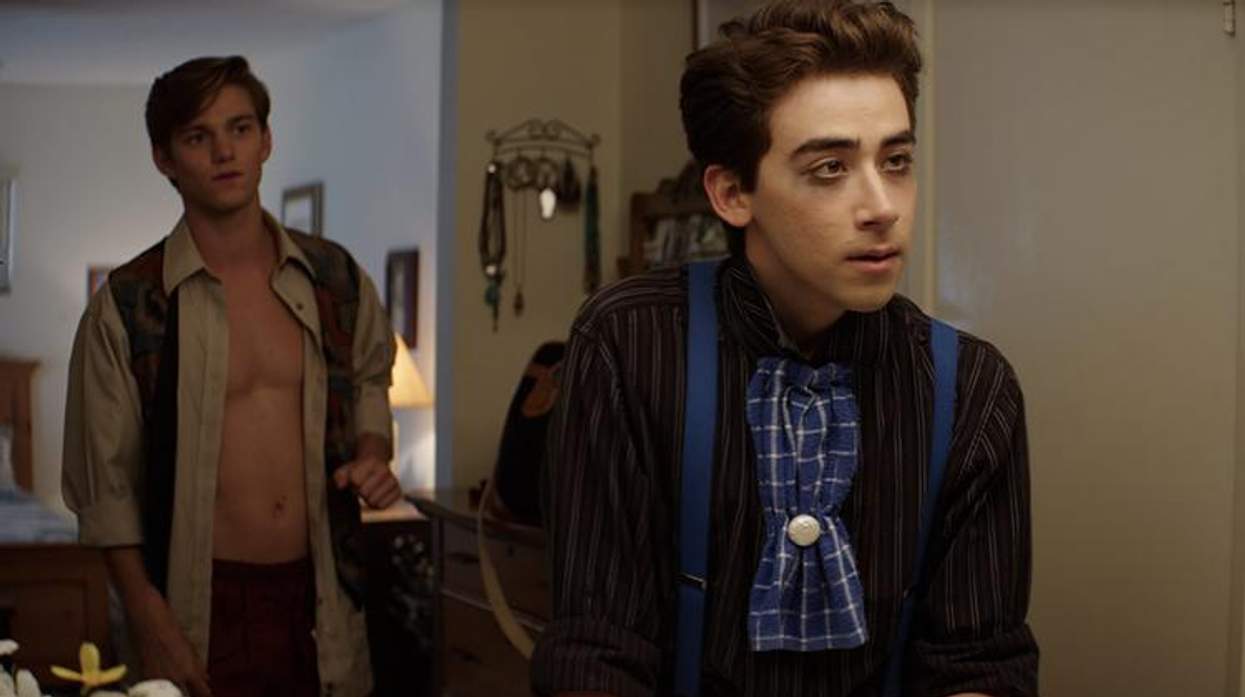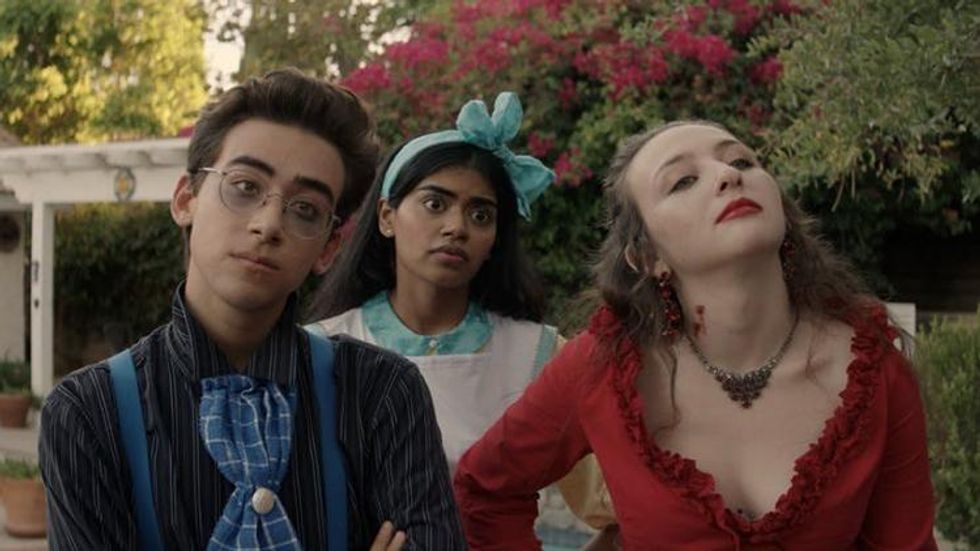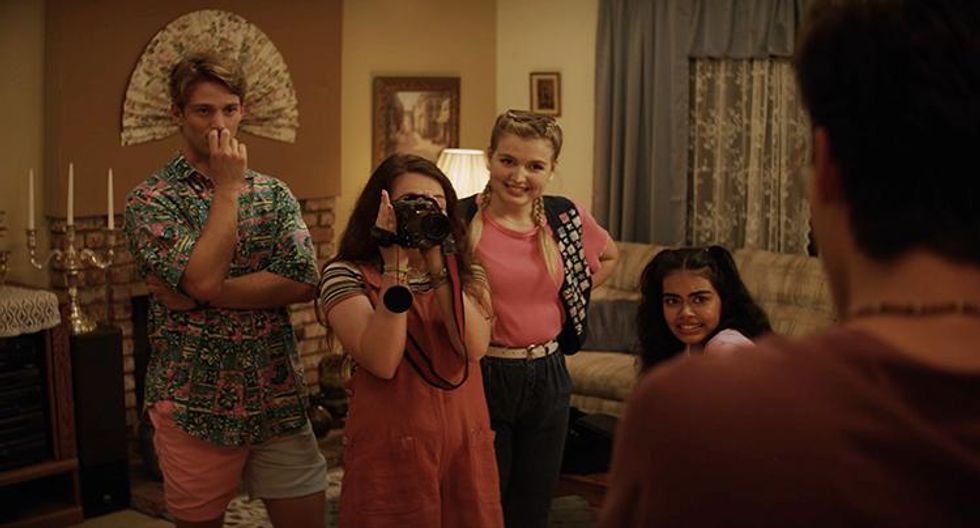One of the standout films being screened at this year's Outfest Los Angeles LGBTQ Film Festival (virtually and at a Malibu drive-in) is Dramarama. The autobiographical film by Jonathan Wysocki is about a closeted teen, Gene (Nick Pugliese), who says goodbye to his four drama friends as they prepare to depart for college.
Set in 1994, Dramarama takes place at a Victorian-themed murder mystery sleepover party, where each young person grapples with coming to terms with their sexuality, their relationships with one another, and their faith; they were raised in conservative Christian and Catholic communities. The bubble is burst by the arrival of an acquaintance, JD (Zak Henri), who holds an unpleasant mirror up to the gathering.
Below, Wysocki discusses the inspiration behind Dramarama, reconciling gay identity and religion, and "subverting the coming-out film."
(Related: Outfest Announces Virtual and Drive-In Screenings of Over 160 Films)
How much of Dramarama is inspired by your own teenhood?
It's a pretty complex blend of fact and fiction. Countless intricate details are ripped directly from my life and the life of my friends, but I'd say the script's story and character arcs are where much of the fiction appears. I was definitely trying to capture the essence of who we all were and what we aspired to be.
You revisited your high school journal before making this film. What surprised you about your younger self?
The naked earnestness of my "diary voice" was really surprising. And, naturally, the naivete is eye-opening. But I think the most surprising part was how adamant I was that my future had to include working in film -- even though I was doing theater at that point. I had forgotten how old that desire was, so it was an unexpected reassurance from my past self.
This group of friends is so queer -- a Victorian-themed murder mystery party where musical theater and literary references abound! But homophobia within this circle also prevents Gene from coming out. What were the challenges of making the stigma believable among these drama nerds?
I think the first factor is that ignorance and denial can go a long way when you're in a restricted environment. The first album I bought as a teen was by the B-52's. I adored them, but was completely blind to their literal and aesthetic queerness. The same with Leonard Bernstein and Tennessee Williams and Stephen Sondheim -- nothing about them registered as queer, and if there was even a glimmer of recognition, I repressed it as much as I could thanks to stigma. And there's the second factor: What you have been told is there's a "moral" line you cannot cross. My theory from all this is that when you're inside a black-and-white bubble, you take things for their face value until you're introduced to critical thinking. The characters in the film are embracing queer texts, but they're not thinking critically about them. It's like the Fried Green Tomatoes joke in the film: the straight-washed film version is innocuous to Claire, but because the book makes the queerness explicit, it then crosses a clear line. Pretending to have queer sex is a funny improv, but actual queer sex is a "sin." I remember all of this taking a lot of mental gymnastics as a teen because the atmosphere was, as you put it, "so queer"!

A lot of this stigma comes from Christianity -- in addition to theater, most of the friends are connected through bonds of faith. What has your own relationship with Catholicism been like? Is it possible for you to reconcile faith with a queer identity?
For my personal journey, Catholicism and my queer identity were not reconciled, but I always appreciated the philosophical diversity within Catholicism that encouraged progressive thought. And I definitely know people who have reconciled their faith with their queer identities -- even though movies usually show faith and queerness at odds with one another. Christianity has so many queer practitioners as well as Christian LGBTQ+ allies, and I feel both of those demographics do not show up in films in complex ways.
What character would you have dressed as to the party?
Well, at the real party this was based on I was Phileas Fogg from Around the World in Eighty Days, but I think I'd like the chance to show up as the forever fop: Dorian Gray.
All of the central characters are contending with some form of sexual repression. We are privileged to know that Gene is gay (if closeted) from the onset, but what about the others?
In my mind, Oscar (Nico Greetham) is also gay but has a very long journey from denial to acceptance ahead of him, hence his "long-distance girlfriend." One of my close high school friends was closeted like me, and I always thought it was interesting that our coming-out trajectories were not aligned. I liked the idea of showing two closeted gay friends at very different stages of their coming-out process. For Rose (Anna Grace Barlow), fear around her own changing body causes her to create a safe fantasy world where she can shut off the reality of sex. Ally's (Danielle Kay) repression is tied up in the oddball stories about herself she's internalized. She gains the confidence to take a risk and break free from that idea of herself. And Claire's (Megan Suri) religious parameters fight against her desire for Gene to the point where her repression manifests in these mini-explosions of violence or sexuality. I enjoy the dramatic tension of unrequited love (cue Chekhov), so I designed the crushes of the characters in a one-way line: Claire wants Gene who wants Oscar who wants JD who wants Ally. Repression abounds!
The opening scene suggests this will be a coming-out film. That doesn't exactly happen. Were you ever tempted to let your character out of the closet? Or were you determined that his journey wouldn't be so straightforward?
I was always interested in subverting the coming-out film because I felt strongly about telling a story where the character is not ready yet -- and that's OK. I like that it sends a message to closeted kids that if you don't feel safe in your environment, it's fine to wait. We have so many amazing coming-out films that show good and bad things happening to their protagonists once they come out -- what about a film where the person decides they're just not ready? Since that was my experience in high school, it also felt like the more honest route as well.

Gene tested the waters with his friends by referencing his "coworker" struggling with his sexuality. Is this a tactic you've employed?
Oh, absolutely. I remember asking my college roommate for advice, but it was all re-gendered to make it about a girl. I cringe just thinking about it!
Have you ever been in a situation where a straight girl was in love with you?
Yes, too many times, and ugh. More cringing! I think the worst part is that sometimes I would go through the courtship but then hide behind my Catholicism before things got physical. Talk about mixed signals. It was awful. I'm sorry, everybody!
Which adjective would JD use to describe you, as he did to the other characters in the film?
Gosh... Punctilious? Fastidious? I don't like where this is going...
What advice would you give to the Genes of the world?
You may not feel like you fit into your world right now, but keep exploring and you'll find your safe spot. Being a young adult brings more freedom for exploration. And if you have best friends like Gene does, they will likely surprise you by holding a supportive love net for you when you're ready to come out. That's what makes best friends the best.
See Dramarama via Outfest's virtual festival at OutfestLA2020.com; it begins screening Saturday and will be available for 72 hours. A drive-in screening will also take place at Malibu's Calamigos Ranch August 30 at 7:45 p.m. The cast will do a live "green carpet" on Instagram Saturday at 7 p.m., followed by a Twitter Watch Pajama Party. Watch a clip below.






































































Charlie Kirk DID say stoning gay people was the 'perfect law' — and these other heinous quotes